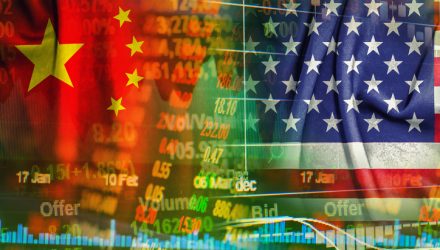U.S. markets and stock ETFs pulled back Monday on growing fears of a protracted U.S.-China trade war that would send the global economy into a recession.
On Tuesday, the SPDR Dow Jones Industrial Average ETF (NYSEArca: DIA) fell 1.1% and SPDR S&P 500 ETF (NYSEArca: SPY) dropped 1.0%.
Goldman Sachs Group Inc warned that the U.S.-China trade war could lead to a recession and it no longer expected a trade deal before the 2020 U.S. presidential election, Reuters reports.
“I don’t think the trade war is going to end any time soon, it could drag on into 2020 … then you have geopolitical concerns,” Ryan Nauman, market strategist at Informa Financial Intelligence, told Reuters. “There isn’t a whole lot that investors can hang their hats on right now. You just don’t have solid corporate earnings or real strong fundamentals other than the labor market.”
U.S. headed toward an imminent downturn?
The markets have staggered in recent weeks on growing concerns over an escalating trade conflict between the two biggest economies in the world. Few analysts have even warned that the U.S. is headed toward an imminent downturn, underscoring the gloomy outlook as reflected by the bond markets where yields have quickly pulled back, the Wall Street Journal reports.
“If [yields]keep edging down, the equity market is clearly wrong because the bond market will be telling you we have one mother of a recession coming,” Neil Dwane, global strategist at Allianz Global Investors, told the WSJ.
Related: Target Sustainable S&P 500 Companies with ‘SNPE’ ESG ETF
Meanwhile, political risk also fueled the uncertainty in Hong Kong where recent protests halted one of the busiest airports in the world and in Argentina where President Mauricio Macri lost in the primary elections.
“Hong Kong is clearly an important bellwether for just how far China is willing to exert its influence,” Matthew Cairns, a senior rates strategist at Rabobank, told the WSJ. “This is a clear show of Chinese strength and I don’t think, just as we are seeing in the trade war, that China will be willing to allow overt breaches of its authority within the region and that clearly is having pretty negative effect in terms of the Hang Seng.”
For more information on the markets, visit our current affairs category.








